A tonga ride unfailingly evokes myriad memories of yore. From mythological heroes, kings of ancient India, Mughal emperors, British rulers and a feisty Basanti played by Hema Malini in Sholay, these horse-driven carriages have ferried a remarkable group of passengers. And they have left an indelible mark on the checkered history and popular imagination of India.
A breezy ride on a magnificently decorated and colourful tonga is one of the most popular tourist attractions near Victoria Memorial in Kolkata and at Marine Drive in Mumbai.
But in the old quarters of Delhi, the sound of hoofs that was synonymous with the city's colonial charm is set to fade away on a sour note. The state government plans to pull the tonga off the streets in an attempt to decongest the heavy traffic in the city.
Reportage: Anisha Ralhan
'Tongawallahs' in dire straits
Image: The future looks bleak for these 'tongawallahs'The Municipal Corporation of Delhi has cancelled the licenses of over 150 tonga owners in its ongoing modernisation drive ahead of the Commonwealth Games. While other aesthetical changes have been heartily welcomed by the citizens, the government's decision to pull the tonga off Delhi's roads has received serious flak.
The decision to cancel the licenses of these horse or mule-driven carriages has specially hit the tongawallahs hard, as they are grappling for an alternative means of livelihood.
"It is insensitive on the part of the government to take away our livelihood all of a sudden. From the last 20 years, I have been earning my bread by ferrying people in and around the walled city," rues Jeevan, 52, who fears his age will hamper any chances of getting a new job.
The tongawallahs earn approximately Rs 200 to 250 per day, but their income has been dwindling as they are constantly harassed by local policemen and traffic cops. Clearly, the street outside old Delhi railway station now lacks its imperial lustre.
'Tongas' are immensely popular among foreign tourists
Image: A proud 'tongawallah'When asked whether the government has offered them any compensation or an alternate means of employment, the tongawallas answered grimly, "No, we have not been promised any alternate career. It is foolish to even expect something like that."
One of them says that the municipal committee is scheduled to hold a meeting soon to decide about providing financial aid till they find an alternative means of livelihood. But he is sceptical about the outcome of such a meeting and maintains that life will never be the same without his beloved tonga.
Thanks to their Victorian flavour, tongas are immensely popular among foreign tourists. Jeevan says 60 per cent of his passengers are foreigners who take the ride to tour the walled city with great zeal. The enthusiastic riders sometimes pay as much Rs 50 for a one-km ride on the tonga, he adds.
If the government is serious about the beautification of the city, it should also consider cracking down on the carts driven by oxen and mules that haul freight on busy roads.
'We're the last few bearers of our legacy'
Image: One of the many 'tongas' pulled off Delhi's roads"Trivialising our ancestral professional in the name of modernisation is shameful. We're the last few bearers of our legacy. Why can't we be left alone," vituperated a tongawalla outside the New Delhi railway station.
Krishna, who recently bought two horses for a whopping price of Rs 50,000 and Rs 1 lakh, wants the government to roll back its order. He wants to carry on with his job as he cannot possibly give up his newly acquired and expensive horses.
The few tongas that ply in areas like Sadar Bazar, Chandini Chowk and old Delhi railway station double up as effective good carriers. Small traders and merchants rely on horse-driven carriages to transport their freight as they cannot bear the exorbitant costs of ferrying their stuff on three wheelers or four-wheelers.
Some passengers believe that tonga rides should be encouraged in the otherwise polluted Old Delhi.
"They are eco-friendly and a great reminder of our vibrant past. If Kolkata can have them at Victoria Memorial, why can't we," quips Deeksha, 23, a local student.
Tongas an integral part of Delhi
Image: A 'tonga' lies in neglect near the Delhi railway stationThe Municipal Corporation of Delhi has faced criticism over its decision of robbing the old city of one of its most vital cultural symbols.
Tongas have been an integral part of Delhi since the 18th century when the Mughal empire was at the height of its glory. While the mighty emperors, princes and princesses traveled in elaborately decorated carriages, the members of the middle-class trotted in the humbler horse-pulled baggas.
By the time the British colonialists strengthened their hold in the country, the tongas had become the lifeline of the capital city. The advent of automobiles on Delhi's swanky roads failed to dampen the business of the horse-driven carriages, which continued to enjoy mass popularity in the serpentine lanes of old Delhi. The charming carriages are a relatively cheaper and interesting way of traveling between popular attractions like Jama Masjid, Red Fort and Cannaught Place.

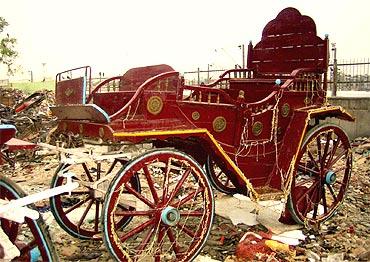
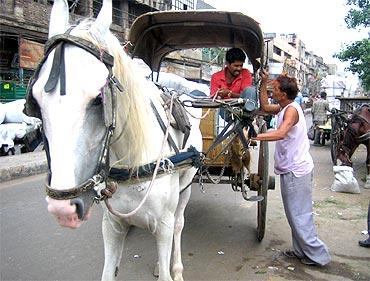
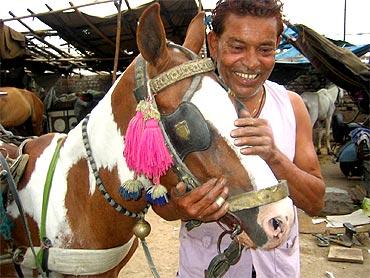
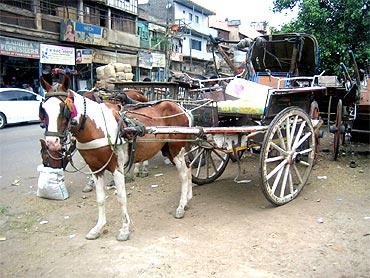
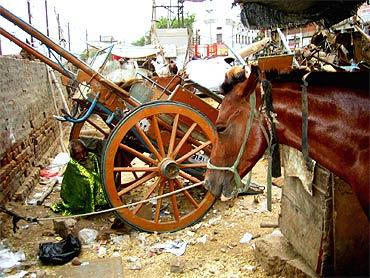
article